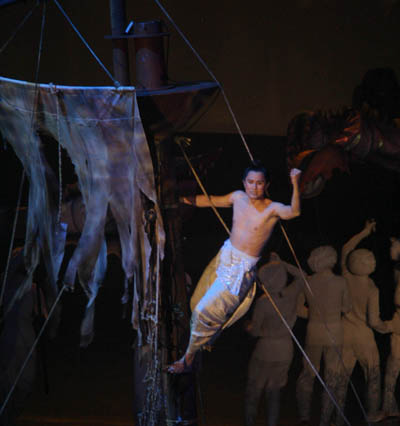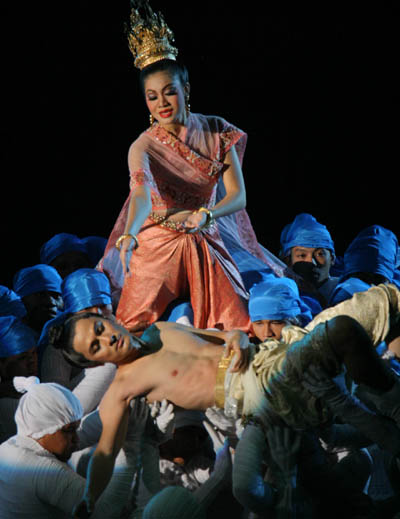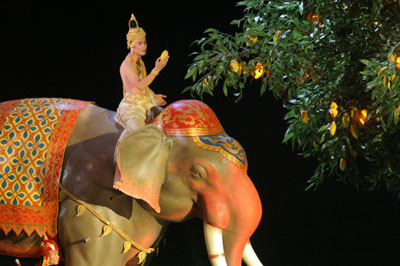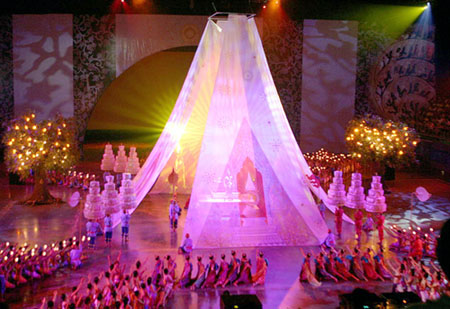|
An exhibition tribute to His Majesty King Bhumibol Adulyadej of Thailand's 60th anniversary of his accession to the throne on June 9, 2006. People came to visit the grand exhibition in Impact Arena Muangthong Thani Bangkok.. A huge tagline attracted people to the King's expo: "…and you will love and respect His Majesty the King even more."
The grand exhibition had three parts: Part One with exhibits of royal activities and royal-initiated projects featuring His Majesty the King's photographic works over the past 60 years, the development of forest resources, the royal philosophy in water resource management, soil problems and solution to degraded soil resources, and sufficiency economy and the New Theory; Part Two, the royal biography; Part Three, the grand stage performance at the Impact Arena.
The Phra Mahachanok grand musical played from May 26 through June 11. The spectacular performance was inspired by the story of Lord Buddha's previous lives. It focused on the virtue of perseverance as a guideline for sustainable development through the use of Dhamma riddles. The entire surface of the arena was transformed into an ocean using modern light and sound techniques.
The music was composed and directed by Mr. Bruce Gaston, a composer from California who resides in Thailand. He had penned 65 minutes of accompanying music. Assistant Professor Dr Narapong Charassri was the art director and choreographer, and Komol Panichaphan designed the costumes. Artistic movements applied from the west were inserted in the performance many times. Imagine a fantasyland! Light and sound with. 400 men from the Thai army pretending to be ocean waves, with 3,000 meters of special woven fabric, special wires ordered from France, and light and sound techniques from Japan.
The Phra Mahachanok grand musical was one of the highlights of this exhibition. The audiences did not need to pay for the tickets. It was free for everyone. But if they wanted to reserve seats, they had to pay 100 Baht ($2.50 USD) for one person. The income will be transferred as a donation for HM's projects.
Assistant Professor Punnasak Sukee was the show's director and scriptwriter he said to me about his work.
"Yes, we are now working hard with pure perseverance just like Phra Mahachanok who swam 7 days 7 nights relentlessly. Now it seems we have to endure in the ocean longer since the Thai Government announce the extension of the exhibition for one more week, and of course, our show is a highlight. Hope you can come and see our show. You have to see with your own eyes how people have tears in their eyes when they learn that the tickets are sold out. It is their love for our King that brings them here."
JSL executive vice president Pusacha Donavanik said at a press conference "We're trying our utmost to pass on all the doctrines incorporated in the literary version. But actually it's hard to tell the whole story in a 45-minute show," she said.
The two main themes of the story were selected for the stage performance. One is Phra Mahachanok's persistent attempts to swim across the ocean, and the other is Phra Mahachanok watching people in his own town struggling madly with a mango tree and then debating whether he will be ordained.
The performance was divided into nine acts, beginning with a scene portraying the gigantic vessel of Phra Mahachanok departing port for the open ocean before being sunk by a storm. "The entire surface of the arena will be transformed into an ocean using modern light and sound techniques," said Pusacha. "The audience will be stunned."
"It's a hard and impressive scene for me," said TV stars Assadawut Loengsoonthorn, who stars as Phra Mahachanok. "I have to have trust these hands [below me] won't let me fall."
Act 1: Departing from a port from 700 leagues:
 |
Phra Mahachanok travels across ocean to the city of Mithila by a gigantic ship. At that time, the storm and tidal waves wrecked the ship. All people drown in the vast ocean and they become the food for fish and turtles except Phra Mahachanok . He stood up, holding onto the mainmast climbed the mainmast hold his conscience, jumped into the ocean and continue to swim. He aimed the direction of Mithila and jump forward off the mast, exerting his great strength to clear a school of fish and turtle
From the moment on, Phra Mahachanok was like a golden banana tree trunk in the waves which had the colour of ruby, swimming in the ocean by the might of his shoulders. A scene portraying the gigantic ship of Phra Mahachanok departing from the port to the vast ocean before it was sunk by the storm.
In the holy Tripitaka the seven individuals in the water (Udakupamasutta) are:
1. The one who plunges in the water and does not emerge is the one who is wholly wicked and evil (The sinner)
2. The one who emerges and sink again is the one who has had a glimpse of faith in wisdom but that faith wanes (The ordinary man)
3. The one who emerges and stays afloat is the one who has fait and keeps it (The virtuous man)
4. The one who emerges, has faith, and looks around is the Sotapanna (The Stream-Winner –the one who enters the stream of Enlightenment)
5. The one who emerges, looks around, and begin to swim toward the shore is the Sakadagami (The Once Returner-the one who will return to this World but once).
6. The one who emerges and comes to the shallow water where he can touch the bottom with his feet is the Anagami (The Non-Returner- the one who will not return to this world)
7. The one who emerges and reaches the firm land and treads the high ground is the Arahat ( The Worthy One – the one who has freed himself of all bondage with mind-emancipation and wisdom-emancipation)
Act 2: The attempt:
Phra Mahachanok swam in the ocean for 7 days and 7 nights. The giant crab helped him from drowning into the ocean.
"…Things that we do not plan may well happen. Things that we do plan may well meet with disaster. Wealth will not come to anybody by just dreaming about it."
After jumping from the top of the mast into the sea he felt like treading on the sea floor, like being near the shore, the same feeling as the sixth individual among the seven Individuals . In fact, it was the giant sea crab came to help him
The believed from the great merit of his perseverance
The 400 men from Thai army performed as water which Phra Mahachanok floats upon.
Act 3: Mani Makhala:
Thai mythological angel in literature who controls weather. When groups of angels have a party in the celestial society. Mani Makhala look at the ocean below upon inspection and saw Phra Mahachanok who was swimming with the great attempt and endurance in the ocean.
At that time , The Four world watchers had entrusted a goddess named Mani
Mekhala to look after all virtuous creatures who did good deeds, such as taking good care of their mother, and who should not die at the sea
Mani Mekhala had not inspected the seas for seven days. It was said that She was absorbed with celestial joys, so she forgot her inspection duties. Other academics say that goddess went to the Celestials' Society.
Anyway, she recalled": Today is the seventh day that I have not inspected
the high seas. I wonder what the situation is upon inspection, she saw Phra Mahachanok perish in the ocean, I'll never be allowed in the Celestials 'Society any more"
Having so pondered, she adorned herself and went to hover not far from him.
To test The Great being, she intoned the first stanza:
"Who's that even the coast is nowhere to be seen, is still swimming in the midst of ocean waves? What mighty use do you see in striving to swim in this manner?"
Act 4: In the ocean:
 |
The angel Mani Mekhala tested Phra Mahachanok about the great intention and attempt. Although Phra Mahachanok couldn't see the shore but he will continue to swim.
Then the great being opined" To this morning we have been swimming the ocean for 7 days .All the time we have been nary a sual as companion. Now who is that speaking to me..?"
"Oh...Goddess, we have reflected upon the worldly behavior and merits of perseverance .Thus we conclude that, even though we do not see the shores, we still have to persist in our swimming in the wide ocean."
Mani Mekhala desiring to hear a further discourse from the great being, intoned another stanza
"The coast of the unfathomable ocean is assuredly not visible to you. Your heroic effort are thus of no avail; you will be dead before you reach a shore"
Upon these remarks, The Great being told Mani Mekhala
"What are you saying?? We are persevering, so that though we may perish, we shall be free from any blame or criticism." Having said that he intoned this stanza:
"Any individual who practices perseverance, even in the face of death, will not be in any debt to relative or gods or father or mother. Furthermore, any individual who does his duty like a man will enjoy Ultimate Peace in the future."
At this point, the goddess addressed the Great being with this stanza:
Any enterprise that is not achieved through perseverance is fruitless; obstacles will occur. When any enterprise undertaken with such misdirected effort result in Death showing his face, what is the use of such enterprise and misdirected effort?
After Mani Mekhala had spoken in this manner, the Great being in order to convince the goddess completely, in toned the next stanza thus:
"Oh Goddess ! Any one who knows for sure that his activities will not meet with success, can be deemed; if that one desisted from perseverance in that way, he will surely receive the consequence of his indolence".
"Ohh Goddess! Some people in this world strive to get result for their endeavors even if they don't succeed."
"Oh Goddess! Do you see clearly the result of actions, don't you?? All the others have drowned in the ocean; we alone, are still swimming and have seen you hovering near us. As for us, we are going to endeavor further to
the utmost of our ability; we are going to strive like a man should to reach
the shores of the ocean".
Having listened to the Great being convincing oration and praise the Great being, the goddess intoned the stanza:
Any one who is full of righteous patience will never founder in the vast ocean
That has no bounds. With this manly perseverance, you will be able to go wherever you wish.
After these words, Mani Mekhala asked "Oh wise one .., who has such determination, where could I take you"? When the great being said Mithila Nagara, she pick up the Great being as lightly as one would pick a bunch of flowers. She cradled him to her breast with her arms like one would one's dear child, flying up in the air
This scene use wires from France and safety specialist took care of the protection from accident. .
Act 5: The city of Mithila:
There is no king in the city of Mithila because the king Polchanok passed away. The prophet of Mithila city release the Grand chariot (Pussaros) for fortune telling. This Grand Chariot stopped at Phra Mahachanok who slept in the royal garden. Then he ascended to the throne of Mithila. Phra Mahachanok had followed the "Tossapitrajadhamm" (10 virtues of the king) for all his lifetime. People live happily ever after.
Act 6: Pathways
 |
Phra Mahachanok was riding on the neck of the royal elephant, left the city with a long retinue, and arrived at the Park.
Near the gate, there were two mango trees with resplendent green foliage. One of these had no fruit; the other had many. The fruit was extremely sweet.
Nobody could pick the fruit from the tree because the King had not yet eaten the tasty fruit. Seated on the next of the elephant, The Great being picked one fruit and test it. As it touched the tip of the Great being's tongue the fruit seemed like nectar.
The Great being thought "We shall eat our fill on the way back" and entered the Royal Park.
The other, from the Viceroy to the elephant mahouts and the horse handlers, seeing that the King had already eaten the tasty fruit, all picked some and had their fill.
Still others who came in later, used stick to break down branches; the tree was denuded of leaves; the tree was uprooted. The other mango three still stood majestically as a mountain glistening like gem.
The King came out of the Royal park; seeing this spectacle, he asked the courtiers: "What is all this?"
The courtiers said "The people, knowing That Your Majesty had already eaten
The succulent fruit, fought among themselves to get a bit of that mango fruit."
The King asked: "The foliage and resplendence of this tree are all gone, but the foliage and resplendence of that yon tree are still intact. How is it so?"
All the courtiers said: "The foliage and the resplendence of the other tree are not all gone because it bears no fruit"
The King, on hearing thus, felt very sad. He mused: "That tree is still beautifully green, because it has no fruit, but this tree has been cut down and uprooted because it bore fruits.
This throne is like the tree with fruits; peaceful retirement is like the tree without fruits. Danger lurks around the one with worries and does not menace the one without worries. We will not be like the tree with fruits; we will be like the one without fruit."
The King returned to the city and went to palace. At the door of the palace, he paused for an instant and thought about what Goddess Mani Mekhala had told him at the moment she picked him up from the sea.
The King could not remember the exact words, for he was exhausted and drowsy from the seven-day swimming in the briny water, but he knew that she had said he would not find the path to absolute happiness without sharing the wisdom he had found in the ocean.
Act 7: The restoration of mango tree.
Phra Mahachanok gave nine methods on how to cure the fallen mango tree. All people followed these precious instructions. That mango tree came back to life once again!
1. Culturing the seeds
2. Nursing the roots
3. Culturing the cuttings
4. Grafting
5. Bud-grafting
6. Splicing the branches
7. Layering the branches
8. Smoking the fruitless tree
9. Culturing the cells
Act 8: The founding of Pudalay Mahavijalaya (name of a knowledge institute):
The King told Brahmin about his past life on the sea
After jumping from the top of the mast into the sea beyond the fish and turtles, He swam in the ocean and rested from time to time, Sometimes we felt like treading on the sea floor, like being near the shore, the same feeling as the sixth individual among the seven individuals (in the fifth Udaku pamasutta) In fact, it was" the Grant sea crab" The Brahmin said "Really that was the great merit of you: perseverance"
Mani Mekhala had told him to establish an institute of high learning Called Pudalay Mahavijjalaya. Once he had fulfilled this mission, he could find the path to peaceful retirement. Pudalay is a Thai word that means Sea crab. The Great being thought "Each one, may be a trader, A farmer, a King or priest, , has his duty to do Any way before any thing else ,
As Goddess Mani Mekhala picked us from the sea, she said "Thou shouldst
Share with others the boon of enlightened wisdom. When time comes thou shouldst establish an institute of high learning." At that time we were exhausted and daze; so we thought we heard Suvanabhumic language.
Phra Mahachanok said that People live in the world of confusion and lack of specific knowledge, common knowledge, or even self benefits People like mangoes but they destroy the good mango tree. It was the right time to call the knowledge institute "Pudalay Mahavijalaya" to educate people away from the ignorant Giant sea crab, who came to keep him alive.
Act 9: Epilogue
 |
All people, Mani Makhala and other angels praised the true virtues of Phra Mahachanok then he decided to take the path of absolute happiness.
The spectacular performance has been adapted from "Mahajanaka," the latest literary work by HM the King Bhumibol Adulyadej of Thailand. Inspired by the story of one of the Lord Buddha's previous lives. It focuses on the virtue of perseverance as a guideline for sustainable development through the use of Dhamma riddles.
The book was published in the celebration of 50th anniversary of accession to the throne of His Majesty. The magnificent vision in his writing about the attempt of a man who couldn't know the future when the ship was sunk or when he desperately saw his people destroy the mango tree and quarrel until he wanted to be ordained. Then he thought about the conversation with Mani Mekhala that now he could not take the path of absolute happiness. He thought that all people should do their duties first. So he still stood beside his people in Mithila city and solved the problems and conflicts.
The restoration of the mango tree concept is one of the restoration plans against deforestation in Thailand of His Majesty. He cares for more than 3,000 projects around the country. Many projects are created to solve agricultural problems. His teaching is embodied in the institute called, "Pudalay Mahavijalaya." This is a university for people with knowledge or experience. It was established for all people to focus on life with nature and use that knowledge for the benefit of all people.
His Majesty's literary work, Mahajanaka, was written from 1977 to 1988
It took nearly eight years for the country's leading artists to illustrate the book. It was published and sold in 1996 during the King's Golden Jubilee
This year 2006, is the Diamond jubilee of the King, who was honored by the United Nations with a lifetime achievement award for his development projects that tackle social problems. In addition to the UNDP Human Development Lifetime Achievement Award, he previously received several awards from other UN organizations: the World Health Organization's "Health-for-All Gold Medal" in 1992 and the Food and Agriculture Organization's Agricola Medal in 1995.
|